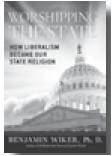|
|
|
"Secular liberalism should be litigated against as a violation of the First Amendment" because it is a religion, according to the author of Worshipping the State. When Christianity is removed from public discourse, a state develops that leaves no room "for the worship of anything but itself." Liberalism has pushed the nation toward erasing all traces of Christianity from the public square, according to Benjamin Wiker. Christians were duped by moral relativists who played Catholics against Protestants, and Protestant denominations against each other. "You don't want Anglicans deciding for you, do you?" When this succeeds, all Christians lose. The goal of liberals is for churches that accept miracles, the Trinity, the Virgin Birth, the Resurrection of Christ, to be supplanted by those that accept Christ as a real nice guy with a terrific philosophy, but with no trace of divinity. Christians are expected to accept moral relativism, which holds that each individual has a right to define his own morality. But secular liberal morality is never neutral. Once there is "no objective morality, no universal good and evil," laws unacceptable to Christians, such as "abortion, infanticide, sexual libertinism, easy divorce, redefinition of marriage, and euthanasia" are imposed by force. Wiker offers "counterrevolution" solutions. He says "the courts and state-mandated education have been the main engines driving the replacement of Christian morality with the hedonistic utilitarianism of liberalism." He recommends teaching true history, including the fact that the Christian religion is not the cause of most wars. Even when religion was a contributing cause, the "primary motivating factor" was political or dynastic rivalry born out of desire for empire. The Biblical base of scientific discovery and literature should also be taught. The First Amendment religion statement "was meant as a protection against incursions by federal power, not a writ for the government to wall religion off and away, out of mainstream American life," says Wiker. Court rulings redefined it, beginning with Everson v. Board of Education in 1947. "Congress shall make no law respecting an establishment of religion, or prohibiting the free exercise thereof" makes no mention of separation of church and state. A return to the original intent of the First Amendment is another crucial restorative step. (Regnery Publishing, 2013, 376 pps., $27.95) |
 He offers a study of governments and the church through the ages, focusing on humanist political philosophers, including Machiavelli, Hobbes, Spinoza, and Rousseau. After explaining how we got here, Wiker addresses what can be done to reverse the current disaster.
He offers a study of governments and the church through the ages, focusing on humanist political philosophers, including Machiavelli, Hobbes, Spinoza, and Rousseau. After explaining how we got here, Wiker addresses what can be done to reverse the current disaster.

